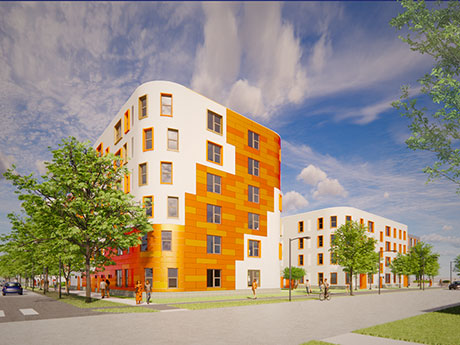CHICAGO — Evergreen Real Estate Group and nonprofit Latin United Community Housing Association (LUCHA) have completed Encuentro Square Apartments in Chicago’s Logan Square neighborhood. The duo developed the project in partnership with the Chicago Department of Housing, the Department of Planning and Development and the Chicago Housing Authority (CHA).
The $67.5 million development comprises two buildings at the western terminus of The 606 trail, an area that has experienced housing costs soar in recent years. The units are designated for families and individuals with incomes at or below 60 percent of the area median income. Managed by Evergreen, Encuentro Square is nearly fully leased. In Spanish, “encuentro” means the act of coming together.
Leopardo Cos. and All Construction were the general contractors. Designed by Canopy, the buildings feature rounded corners with orange paneling. The orange panels are meant to mimic the migration pattern of the monarch butterfly.
Floor plans range from one- to three-bedroom units. Fifty-five of the homes benefit from long-term project-based rental assistance administered by the CHA, of which 44 are family-sized units with at least two bedrooms.
Amenities include a community room, teaching kitchen, children’s playroom, private courtyard, resident lounges, laundry rooms and bike storage. A new playspace is directly across the street from the building at 1844 N. Ridgeway Ave., next to the McCormick YMCA. Evergreen donated $25,000 and volunteer hours to build the new playground in partnership with KABOOM!, a national nonprofit. Community support services are also available to residents, including home-based early head start in partnership with the Children’s Place Association, as well as financial counseling.
Evergreen funded Encuentro Square with approximately $32.1 million in equity generated by city-sourced Low-Income Housing Tax Credits; $1.7 million in funds generated by state tax credits from the city’s donation of the project property; $9 million in city-sourced tax-increment financing funds; $14.5 million in city-sourced loan funds; and private mortgage debt of $6.8 million, among other sources.


